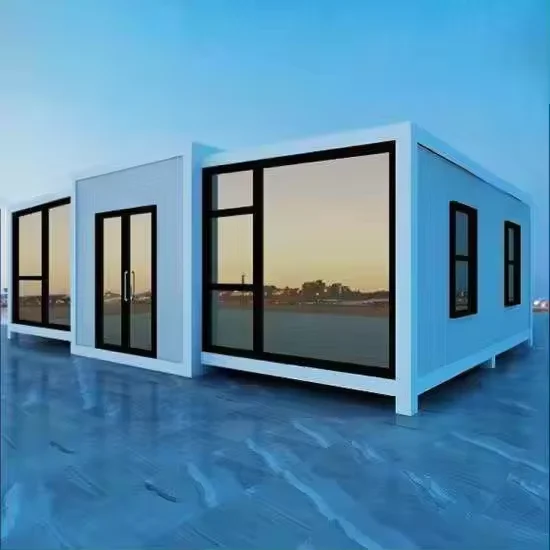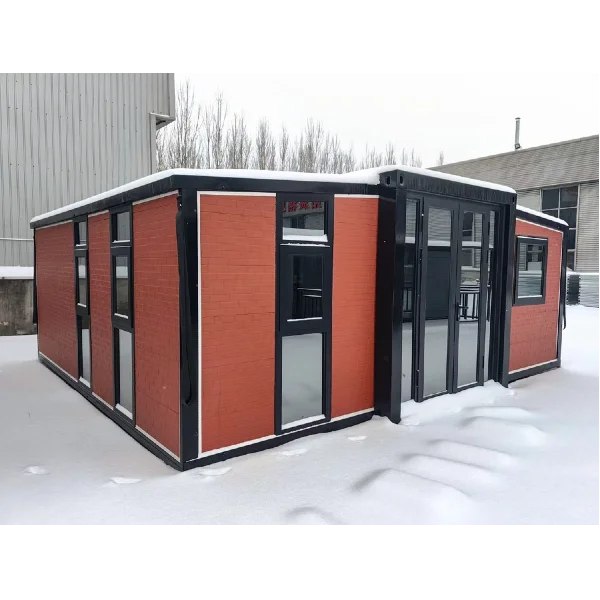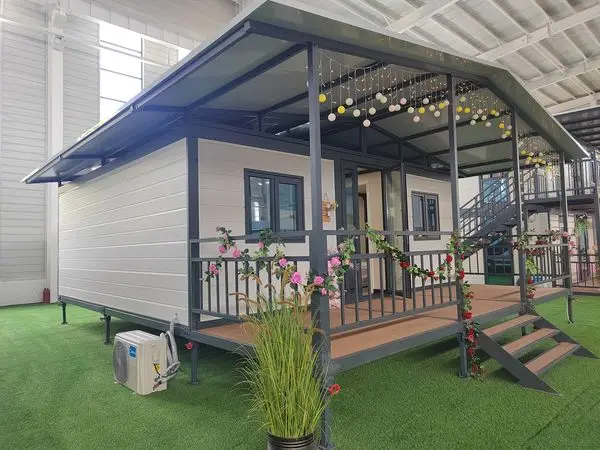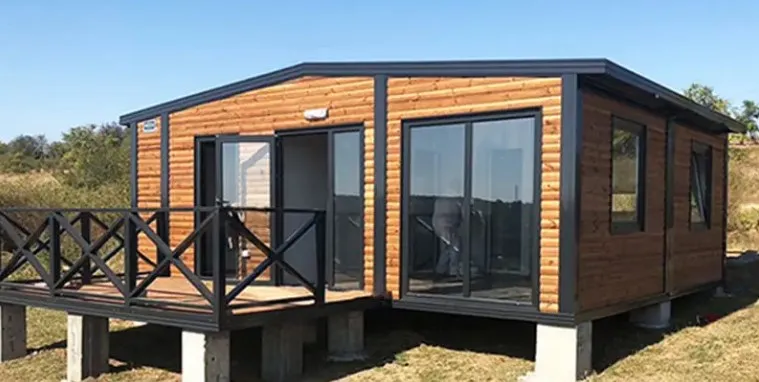Welcome To Laizhou Dingrong Steel Structure From China
Whatsapp:+8615192384158

?
A folding container house, as the name suggests, is a type of modular housing structure based on the concept of collapsible containers. It is designed with the primary components, such as sidewalls, end walls, and the roof, being able to fold or disassemble with relative ease. This innovative design allows for significant space-saving during transportation and storage. When compared to traditional shipping containers or prefabricated houses, folding container houses can be stacked and transported more efficiently, reducing the cost and logistical challenges associated with moving large volumes of building materials.
For example, in the context of international aid after a natural disaster, a shipment of folding container houses can be loaded onto a cargo ship in a fraction of the space required by non-folding alternatives. This means more units can be sent to the affected areas in a single trip, providing shelter to those in need much faster. Once on-site, they can be quickly unfolded and assembled, transforming into habitable living spaces in a matter of hours.
One of the most significant advantages of folding container houses is their ease of transportation. Traditional housing structures often require large trucks or even multiple trips to transport all the necessary components. In contrast, folding container houses can be folded down to a fraction of their original size, allowing for more units to be loaded onto a single vehicle. This not only reduces transportation costs but also minimizes the carbon footprint associated with shipping building materials.
For instance, a standard 40-foot shipping container can be folded into a compact size that can fit into the bed of a pickup truck when disassembled properly. This means that it can be easily transported to remote locations where access might be limited, such as mountainous regions or small islands. Once on-site, the installation process is straightforward and doesn't require extensive technical knowledge or specialized tools. Most folding container houses come with detailed assembly instructions and can be put together by a small team in a matter of hours. This is especially beneficial in emergency situations like disaster relief, where quick shelter solutions are crucial.
Cost is a major factor when it comes to housing and construction projects. Folding container houses offer a highly cost-effective alternative to traditional building methods. The materials used in their construction are often more affordable and readily available compared to those needed for brick-and-mortar buildings. Additionally, the shorter construction time means lower labor costs. There's no need to hire a large construction crew for weeks or months on end.
For a small business looking to expand its office space, opting for folding container houses can save thousands of dollars in building costs. Instead of spending months and a significant budget on constructing a new annex, they can purchase and install folding container units in a matter of days. The long-term savings are also notable, as maintenance costs are generally lower. The durable materials used can withstand the elements, reducing the need for frequent repairs and replacements.
Folding container houses can be customized to meet a wide range of needs and preferences. Whether it's for residential, commercial, or industrial use, these structures can be modified to fit the specific requirements. For residential use, they can be designed with insulation, windows, and doors to create a comfortable living space. In a commercial context, they can be transformed into pop-up shops, cafes, or temporary offices.
For example, an artist might want to create a unique studio space. A folding container house can be customized with large skylights to let in natural light, openable sides to create an alfresco working area during good weather, and built-in storage shelves for art supplies. The versatility also extends to the ability to combine multiple units. They can be stacked on top of each other to create multi-story structures or joined side by side to expand the floor area. This flexibility makes them suitable for everything from a single-person dwelling to a large-scale event venue.

Folding container houses have found extensive use in the residential sector, especially in situations where quick and flexible housing solutions are needed. In the aftermath of natural disasters such as earthquakes, hurricanes, or floods, they serve as emergency shelters. Their rapid deployment capabilities mean that displaced families can have a roof over their heads within hours, providing them with a safe and dry living space until more permanent housing can be arranged.
For example, after a major earthquake in a developing country, international aid organizations often deploy folding container houses to set up temporary refugee camps. These units can be equipped with basic amenities like beds, solar-powered lighting, and water filtration systems, ensuring the basic comfort of the affected population.
Beyond emergency situations, they are also popular as temporary housing for seasonal workers. In agricultural regions during harvest seasons, or in tourist destinations during peak tourist months, employers can provide folding container houses as accommodation for their staff. This eliminates the need for long-term leases on traditional apartments and provides a convenient, on-site living option.
Moreover, with proper insulation, interior decoration, and the addition of amenities like balconies and gardens, folding container houses can even serve as permanent residences. Some people choose to build small communities of folding container homes, creating a unique and sustainable living environment. These homes can be customized to fit different family sizes and lifestyles, from cozy single-bedroom units for individuals to multi-bedroom, multi-story configurations for larger families.
In the commercial realm, folding container houses offer a plethora of opportunities. Pop-up shops have become a trendy and cost-effective way for brands to test new markets, launch limited-edition products, or participate in festivals and events. A folding container house can be easily transformed into a stylish retail space, with large display windows, customizable interiors, and even built-in storage and checkout counters.
For instance, a fashion brand might set up a pop-up shop in a busy downtown area using a folding container house. They can quickly assemble the unit, decorate it to match their brand aesthetic, and showcase their latest collection. Once the event or promotional period is over, they can disassemble and relocate the shop to another location with minimal hassle.
Mobile cafes and food trucks also benefit from the concept of folding container houses. These structures can be outfitted with commercial-grade kitchen equipment, serving counters, and seating areas. They offer the flexibility to move to different locations depending on foot traffic, events, or seasons. Some mobile cafes even have rooftop seating or expandable sides to create more space during busy periods.
Outdoor exhibitions and galleries are another area where folding container houses shine. Artists and curators can use them to display artworks in unique outdoor settings, such as parks or waterfronts. The modular nature of these houses allows for easy customization of the exhibition space, with adjustable lighting, movable walls, and climate control options to protect delicate artworks.
On industrial and construction sites, folding container houses play a crucial role. They serve as temporary offices for project managers, engineers, and administrative staff. These offices can be equipped with desks, chairs, computers, and communication equipment, providing a functional workspace in the midst of the construction chaos.
For large construction projects like building a skyscraper or a new industrial complex, folding container houses can be set up as on-site meeting rooms. They are soundproofed to ensure confidential discussions and can be fitted with audiovisual equipment for presentations and video conferences.
Worker dormitories are another essential application. Construction workers often need to stay close to the site, especially for projects in remote locations or with tight schedules. Folding container houses can be arranged in dormitory-style layouts, with bunk beds, shared bathrooms, and laundry facilities. This not only provides accommodation for the workers but also helps in maintaining a sense of community and improving productivity.
In addition, they can be used as storage units for tools, equipment, and building materials. Their durable construction and lockable doors ensure the safety of valuable items on-site. Some folding container storage units are even designed with shelving systems and forklift access to facilitate easy organization and retrieval of stored goods.

Folding container houses also offer significant environmental benefits. The materials used in their construction are often recyclable, reducing the demand for new raw materials and minimizing waste. For example, the steel frames and aluminum components can be melted down and reused in other manufacturing processes.
Compared to traditional construction methods that generate large amounts of construction waste, folding container houses produce far less debris. This not only helps in reducing landfill waste but also cuts down on the energy and resources required for waste disposal. Additionally, their energy consumption during use can be relatively low, especially if they are equipped with energy-efficient insulation and appliances. This makes them a more sustainable housing option, aligning with the growing global focus on environmental conservation.

In the aftermath of Hurricane Katrina in the United States, folding container houses were deployed to provide temporary shelter for thousands of displaced residents. These units were quickly assembled in large numbers, offering a safe haven from the elements. They were equipped with basic necessities like beds, portable toilets, and generators. The modular design allowed for easy expansion of the shelter area as more people arrived. Feedback from the survivors was largely positive, with many expressing gratitude for the speed and efficiency with which the folding container houses were set up. They provided a sense of stability and security during a chaotic and traumatic time.
A well-known coffee chain in London decided to test a new market in a trendy neighborhood using a folding container house as a pop-up shop. They customized the unit with their signature branding, large glass windows, and a cozy interior. The compact space was efficiently designed to accommodate a coffee bar, seating area, and a small retail section for branded merchandise. Over the course of a month-long trial, the pop-up shop attracted a significant amount of foot traffic. The mobility of the folding container house allowed the coffee chain to relocate it to another high-traffic area after the initial run, maximizing their exposure and sales. They reported a high return on investment and plans to use similar setups in future marketing campaigns.
In a suburb of Sydney, Australia, a developer embarked on an innovative project to create a sustainable residential community using folding container houses. They combined multiple units to form multi-story apartment complexes, with shared green spaces and community facilities. Each container house was customized with energy-efficient insulation, solar panels, and balconies. Residents were able to move in quickly, and the community thrived. Surveys among the residents showed high satisfaction levels, citing the unique design, affordability, and environmental friendliness of the homes. The project also received local government recognition for its contribution to sustainable urban development.

Looking ahead, the future of folding container houses holds exciting possibilities. With the rapid advancement of technology, we can anticipate several trends that will further enhance their functionality and appeal.
One of the most prominent trends is the integration of smart technology. Imagine a folding container house equipped with sensors that can monitor temperature, humidity, and air quality, automatically adjusting the internal environment for optimal comfort. Smart lighting systems could be installed, allowing residents to control the ambiance with a simple voice command or through a mobile app. Security features such as facial recognition door locks and surveillance cameras could provide enhanced protection, making these houses not only convenient but also safe.
Solar energy utilization is another area set to see significant growth. As the world moves towards more sustainable energy sources, folding container houses could be designed with built-in solar panels that are more efficient and aesthetically pleasing. These panels could power all the electrical appliances and systems within the house, reducing reliance on the grid and further lowering energy costs. In some cases, excess energy could even be stored in batteries for use during cloudy days or at night.
In terms of materials, researchers are constantly exploring new options that are stronger, lighter, and more environmentally friendly. Composite materials that combine the durability of metal with the insulation properties of advanced polymers could become commonplace. This would not only improve the overall performance of folding container houses but also make them even more energy-efficient. Additionally, self-healing materials that can repair minor damages automatically are being developed, potentially increasing the lifespan of these structures and reducing maintenance requirements.
The future of folding container houses is bright, with innovation driving them to become an even more integral part of our living and working landscapes. Whether it's providing affordable housing solutions in urban areas, serving as mobile workspaces for the digital nomad generation, or acting as emergency shelters in times of crisis, these adaptable structures are poised to meet the evolving needs of society.

In conclusion, folding container houses have emerged as a remarkable innovation in the world of architecture and construction. Their unique folding design, combined with a host of advantages, has made them a popular choice for a diverse range of applications. From providing emergency shelter in the wake of disasters to serving as trendy pop-up shops and efficient office spaces, these structures have proven their versatility time and again.
The ease of transportation and installation, cost-effectiveness, and customizability make them an attractive option for both individuals and businesses. Moreover, their positive environmental impact, through recyclable materials and reduced waste generation, aligns with the global push towards sustainability.
As we look to the future, with the integration of smart technology, enhanced solar energy utilization, and the development of advanced materials, folding container houses are set to reach new heights of functionality and desirability. Whether you're an entrepreneur seeking a flexible business space, a homeowner in need of an affordable and unique dwelling, or an advocate for sustainable living, keeping an eye on the evolution of folding container houses is well worth your while. They are not just a passing trend but a significant step forward in how we create and utilize living and working spaces.
E-mail format is wrong

E-mail format is wrong
